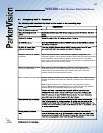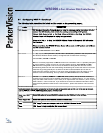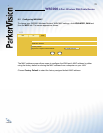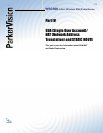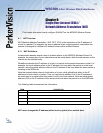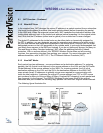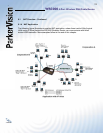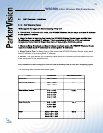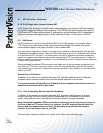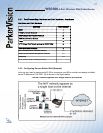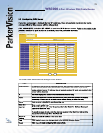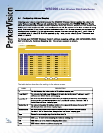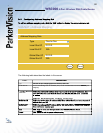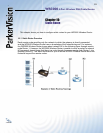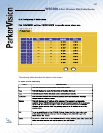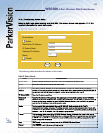
WR3000 4-Port Wireless DSL/Cable Router
®
76
9.1 NAT Overview - Continued
9.1.6 SUA (Single User Account) Versus NAT
SUA (Single User Account) is a ParkerVision implementation of a subset of NAT that supports
two types of mapping, Many-to-One and Server. The WR3000 Wireless Router also supports
Full Feature NAT to map multiple global IP addresses to multiple private LAN IP addresses of
clients or servers using mapping types. Select either SUA Only or Full Feature in WAN IP.
9.2 SUA Server
An SUA server set is a list of inside (behind NAT on the LAN) servers, for example, web or
FTP, that you can make visible to the outside world even though SUA makes your whole
inside network appear as a single computer to the outside world.
You may enter a single port number or a range of port numbers to be forwarded, and the local
IP address of the desired server. The port number identifi es a service; for example, web service
is on port 80 and FTP on port 21. In some cases, such as for unknown services or where one
server can support more than one service (for example both FTP and web service), it might be
better to specify a range of port numbers. You can allocate a server IP address that corresponds
to a port or a range of ports.
Many residential broadband ISP accounts do not allow you to run any server processes (such
as a Web or FTP server) from your location. Your ISP may periodically check for servers and
may suspend your account if it discovers any active services at your location. If you are unsure,
refer to your ISP.
Default Server IP Address
In addition to the servers for specifi ed services, NAT supports a default server IP address.
A default server receives packets from ports that are not specifi ed in this screen.
If you do not assign a Default Server IP Address, then all packets received for ports not
specifi ed in this screen will be discarded.
9.2.1 Port Forwarding: Services and Port Numbers
In addition to the servers for specifi ed services, NAT supports a default server. A service
request that does not have a server explicitly designated for it is forwarded to the default
server. If the default server is not defi ned, the service request is simply discarded.
Many residential broadband ISP accounts do not allow you to run any server processes
(such as a Web or FTP server) from your location. Your ISP may periodically check for
servers and may suspend your account if it discovers any active services at your
location. If you are unsure, refer to your ISP.
The most often used port numbers are shown in the table on the following page.



